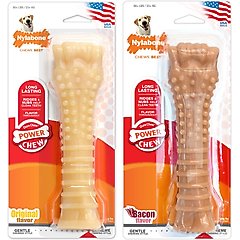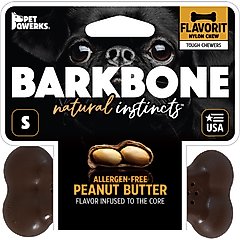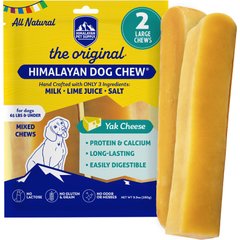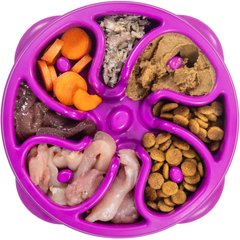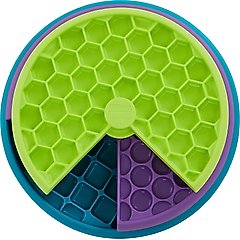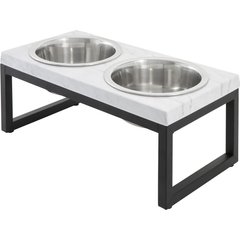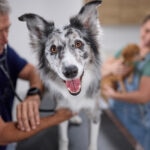6 Common Causes of Choking in Dogs—and What To Do
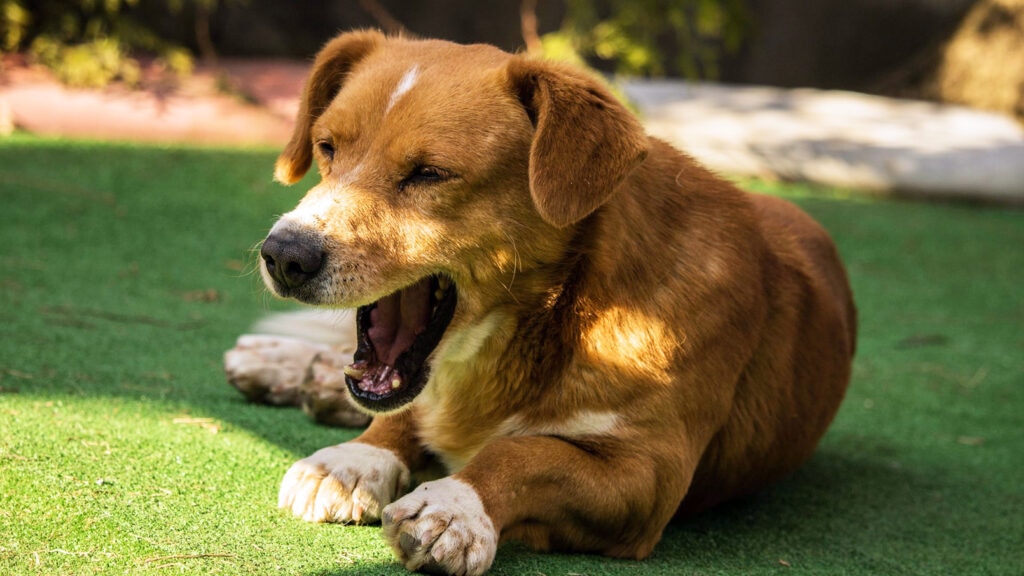
Photo by Marius Geani Dimancea/iStock/Getty Images Plus
Few things send a pet parent into panic mode faster than seeing their dog choking. It can happen in an instant over a bite of kibble, a chewed-up toy, or something your pup grabbed off the ground when you weren’t looking.
We spoke to two veterinarians to understand the most common causes of dog choking and how to help a choking dog. From recognizing the signs to performing the doggy Heimlich, here’s what every dog parent should know.
Key Takeaways:
- Dog choking is rare but can be life-threatening. Spot the signs early—gagging, trouble breathing, blue gums—and act fast.
- Common culprits include toys, food, and household items, as well as breed-specific risks like BOAS in flat-faced pups.
- Learning the dog Heimlich could save your pup’s life—don’t wait for an emergency to learn it.
- Prevent choking with smart choices. Pick the right toys and kibble, supervise chew time, and try slow feeders for speedy eaters.
Can Dogs Choke?
Yes, dogs can absolutely choke, and it can happen to dogs of any age or size. That said, it’s not very common, as dogs can often cough up food or foreign materials stuck in their throat on their own, says Raymond Spragley, DVM, founder of Zen Dog Veterinary Care, in Tuckahoe, New York.
Still, it’s important for pet parents to recognize the signs of choking, because when it does happen, it can be life-threatening and every second counts, he adds.
What Is Choking in Dogs?
Choking in dogs occurs when an object blocks the windpipe (trachea) or becomes lodged in the esophagus, putting pressure on the trachea and preventing it from opening normally, Dr. Spragley explains. This can stop air from reaching the lungs, making it hard (or even impossible) for the dog to breathe.
In severe cases, choking can cut off oxygen to the brain, leading to unconsciousness or death if not treated right away.
What Are the Signs of Dog Choking?
According to Michael Hyder, medical director and emergency veterinarian at VEG ER for Pets, in Palo Alto, California, common signs of choking in dogs include:
- Distressed behavior, such as pawing at the mouth, panicking, or pacing
- Gagging or retching
- Coughing repeatedly without bringing anything up
- Labored or noisy breathing
- Blue or pale gums or tongue
- Excessive drooling
- Collapse or fainting (in severe cases)
What Causes Choking in Dogs?
Choking in dogs can be caused by a variety of items or situations. Common causes include:
- Foreign object stuck in the throat: Small toys, sticks, bones, or household items like socks, hair ties, or rubber bands can block a dog’s airway if swallowed or chewed.
- Food blockages in the throat: Large chunks of food, rawhide, treats, or kibble that aren’t chewed properly can become lodged in the throat, especially in dogs who gulp their food.
- Esophageal blockage: Sometimes an object doesn’t block the windpipe directly but gets stuck in the esophagus (the tube that carries food to the stomach). If the object is large or positioned in just the right way, it can press against the trachea and interfere with normal breathing.
- Brachycephalic obstructive airway syndrome (BOAS): Dogs with flat faces, such as Pugs, Bulldogs, and Shih Tzus, are prone to BOAS. Their shortened skulls can lead to narrow airways, an elongated soft palate, and other structural issues that make breathing more difficult. Their anatomy can make them more vulnerable to airway blockages, especially when they’re overheated or overexcited, or they have something mildly obstructing their throat.
- String or thread: Long, thin items such as dental floss, string, or yarn can become wrapped around the tongue or lodged in the throat.
- Swollen throat or allergic reaction: Severe allergic responses (anaphylaxis) can cause swelling in the throat, restricting airflow.
What To Do if Your Dog Is Choking
If your dog is choking, try to stay calm and act quickly. Here’s how to help a choking dog, step by step:
1. Check Their Mouth Carefully
“Gently open their mouth and look for an object,” Dr. Hyder says. “If you can see it clearly and it’s not lodged tightly, you can try to remove it with your fingers—but be careful not to push it farther down.”
Dr. Hyder warns against performing a blind finger sweep, which involves feeling around in your dog’s mouth when you can’t see the object. He says this can sometimes cause injury or push the item deeper.
2. Perform the Heimlich Maneuver for Dogs if Needed
If your dog is conscious but still choking, Dr. Hyder says you can perform a dog-specific first-aid procedure to dislodge the object.
Here’s how to perform the Heimlich maneuver for dogs:
- Hold them with their back against your chest (small dogs only), stand behind them, or place them in a standing position.
- Make a fist with one hand and cup your other hand around your fist.
- Perform five rapid thrusts into the belly, just under the ribs, by thrusting your fist into the belly and up toward the ribs.
- If this doesn’t dislodge the object, give five sharp blows to your dog’s back between the shoulder blades.
- If the object still doesn’t dislodge, try lifting their hind legs like a wheelbarrow to encourage the object to slide forward (for medium/large dogs). For small dogs, try holding your dog upside down by their hips/thighs and carefully swing them side to side.
- Repeat this process until the object is dislodged. Remember to periodically check to see whether the object has dislodged enough to be removed with your fingers.
If the object doesn’t dislodge after several attempts or your dog becomes unresponsive, lay them on their side, open their mouth, and look for any visible blockage. Call a veterinarian or an emergency clinic right away for guidance. They might instruct you to start rescue breathing and chest compressions or advise you to go straight to the emergency room.
3. Take Your Dog to an Emergency Pet Clinic
You should take your dog to a pet emergency clinic if:
- Your dog won’t let you open their mouth and/or remove the object
- Your dog is struggling to breathe
- Their gums or tongue turn blue or pale
- They collapse or lose consciousness
- You don’t see an object, but signs persist
4. Call Your Vet
If you are able to remove the object on your own, Dr. Hyder advises that you should still call your vet after the incident, even if your dog seems fine afterward.
“Choking can cause internal injuries to the throat or airway that aren’t visible right away,” he says.
How Can I Prevent My Dog From Choking?
“While not all choking can be prevented, there are smart steps you can take to reduce the risk,” Dr. Hyder says.
Choose Toys Wisely
Always choose toys that match your dog’s size and chewing style.
Small toys can be a choking hazard for larger dogs, and aggressive chewers need tough, durable options like the Nylabone Power Chew Bundle or the Pet Qwerks Barkbone.
Recommended Products
Homes with dogs of varying sizes who share toys come with extra risks, Dr. Spragley adds.
To reduce the chance of choking, make sure each dog has toys suited to their size and always supervise playtime.
Consider Food Size
There’s a reason dog kibble is labeled by size. “Large dry kibble or treats can pose a problem for small dogs or dogs who eat too fast,” Dr. Hyder says.
To help prevent this, always choose a kibble size that’s appropriate for your dog’s breed and chewing ability.
Supervise With Bones and Chews
“Hard bones, rawhides, and bully sticks can break, splinter, or be worn down into smaller choking hazards,” Dr. Hyder says.
While some dogs handle these chews without issue, they can be risky for others. If you choose to give them, always supervise your dog and throw out any broken pieces.
You might also consider safer alternatives, such as Himalayan Pet Supply Yak Cheese Chews or rubber chew toys that hold treats, like the KONG Classic Dog Toy.
Recommended Products
Slow Down Fast Eaters
Dogs who gulp down their food are at a higher risk of choking, Dr. Hyder explains.
To slow things down, he recommends using a slow feeder bowl, such as the Outward Hound Fun Feeder Interactive Dog Bowl, or a food puzzle toy, like the Outward Hound Lickin’ Layers Interactive Puzzle Game.
Recommended Products
Elevated bowls, such as the Frisco Stainless Steel Double Elevated Dog Bowl, can help slow down fast eaters, particularly in larger dogs, Dr. Hyder adds.
Recommended Product
Keep Small Objects Out of Reach
Items such as socks, hair ties, string, or small kids’ toys are common choking hazards.
Make sure your home is dog-proofed: Keep hazardous objects off the floor or in closed drawers and bins, Dr. Hyder says.
Know Your Dog’s Breed Risks
Flat-faced breeds (brachycephalic dogs) like Bulldogs and Pugs are more prone to airway issues.
Talk with your veterinarian about the unique risks associated with their breed and how to minimize choking hazards.
Learn Pet First Aid
Knowing how to help a choking dog can make all the difference in an emergency.
Consider taking a pet CPR and first aid course to feel confident in handling urgent situations.
FAQs About Dog Choking
Q: Can dogs choke on food or toys?
A: Yes, dogs can choke on food and toys. Large kibble, rawhide, bones, or treats that aren’t chewed properly can block the airway. Small toys or toy pieces can also pose a serious choking risk.
Q: How can I tell if my dog has something stuck in their throat?
A: Signs include gagging, coughing, drooling, pawing at the mouth, difficulty breathing, or panic. In severe cases, their gums might turn pale or blue, and they might collapse if they’re unable to breathe. If possible, look and feel in their mouth to see whether there is anything stuck.
Q: How can I clear my dog’s throat?
A: If it’s safe, open your dog’s mouth and look for a visible object. If you can see the object, use a gentle finger sweep to try to remove it without pushing it deeper. If the object isn’t visible or you can’t remove it, perform the dog Heimlich maneuver or head to the emergency vet immediately.
Q: What do I do if my dog is making choking noises?
A: Stay calm and observe. If your dog can still breathe or cough, they might be able to dislodge the object on their own. Monitor closely, but if they begin struggling to breathe or show signs of distress, act quickly. Check their mouth, try to dislodge the object (if you can see it), and contact your vet or an emergency clinic right away.
Q: Do I need to give my dog CPR?
A: CPR is necessary only if your dog becomes unconscious and is not breathing. You’ll need to perform rescue breaths and chest compressions. If this happens, call an emergency vet immediately for step-by-step guidance and begin CPR if instructed.
